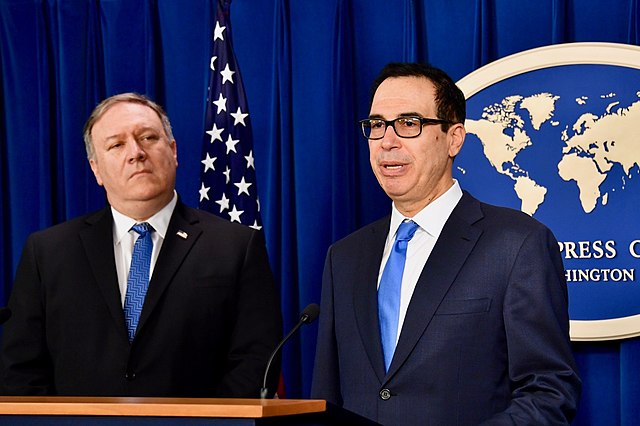How Securities Law Can Help the U.S. Counter INSTEX
On Jan. 31, the governments of France, Germany and the United Kingdom formally announced the establishment of the Instrument in Support of Trade Exchanges (INSTEX), a Special Purpose Vehicle dedicated to facilitating trade between European economic actors and Iran. The creation of INSTEX by the three countries—known as the E3—followed months of negotiations in the wake of the United States’s 2018 exit from the Iran nuclear deal.

Published by The Lawfare Institute
in Cooperation With

On Jan. 31, the governments of France, Germany and the United Kingdom formally announced the establishment of the Instrument in Support of Trade Exchanges (INSTEX), a Special Purpose Vehicle dedicated to facilitating trade between European economic actors and Iran. The creation of INSTEX by the three countries—known as the E3—followed months of negotiations in the wake of the United States’s 2018 exit from the Iran nuclear deal. That deal lifted international sanctions on Iran in exchange for Tehran imposing restrictions on its nuclear program. Following its exit from the deal, the U.S. reimposed “secondary” sanctions that prohibit American companies from doing business with foreign companies that do business in Iran.
While operational details for INSTEX still need to be defined, the vehicle’s underlying objective is to facilitate payment transactions among European and Iranian businesses outside the parameters of the U.S. financial system, which would have to be used if any transactions in U.S. dollars were involved—consequently subjecting any banks facilitating such transactions to U.S. sanctions. At a minimum, INSTEX will oversee a ledger of payments related to exports and imports between Europe and Iran, coordinating payments so that a European exporter of goods to Iran can get paid by a European importer of goods from Iran and thereby avoid entering into a cross-border transaction. An Iranian counterpart to INSTEX would coordinate payments between the Iranian transaction parties. While such a model would admittedly cover only a small portion of Iran’s trades (exports would always have to equal imports in order for the payment transactions to balance out), the hope among many involved with the creation of INSTEX is that it would eventually process all payments among trading participants, functioning more like a bank as opposed to an intermediary focused on pairing export and import liabilities.
The emergence of a financial intermediary vehicle that exists beyond the U.S. financial system has potentially adverse implications for U.S. sanctions policy. Much of the United States’s ability to pressure foreign governments and companies to avoid doing business in Iran—as well as other sanctioned countries—derives from the reliance of global economic actors on access to the U.S. financial system for cross-border transactions. Despite this, American officials have, at least in public, been largely muted in their reactions to the announcement of the plan, stressing that, while they are “closely following” reports on the European mechanism, they do not expect it to impinge on U.S. efforts to exert maximum economic pressure on Iran. Many experts have in fact expressed a lack of confidence in INSTEX’s prospects based on the assumption that its personnel and operation could easily be made subject to additional U.S. sanctions.
Although it is hard to say exactly how INSTEX will affect U.S. sanctions policy until more details about its structure are revealed, there are several key issues that U.S. policymakers ought to consider sooner rather than later in evaluating how to contend with the development of the vehicle. First, it will be politically more difficult for the U.S. to penalize INSTEX and its participants for engaging in problematic activity in the event INSTEX actually does become commercially successful. A thriving INSTEX would mean more European businesses with a vested interest in building commercial ties with Iran, which would consequently place greater pressure on European governments not to yield to American economic pressure without any pushback. The effort by the E3 to establish INSTEX is itself partly the result of pressure from European companies that entered the Iranian market following the execution of the Iran deal and are eager to continue doing business.
Second, the United States’s capacity to exert economic pressure on Iran has in significant respects been driven not just by legal measures such as sanctions but also by the U.S.’s ability to persuade European companies to avoid the Iranian market because of the inherent riskiness of engaging with Iranian counterparties—many of which lack transparent ownership structures and are not required to comply with basic anti-money laundering standards. In particular, this has meant that European companies, especially banks, that engage in business in Iran risk running afoul of other U.S. laws pertaining to internal controls and compliance, and thereby becoming subject to the frequently severe penalties associated with such violations. Indeed, despite the panoply of U.S. sanctions imposed against Iran since 1979, the United States was able to bring the Islamic republic to the economic brink in the late 2000s only after mounting a systematic campaign of outreach that focused on convincing hundreds of European companies of the prohibitively high risks of engaging in business with Iran. Similarly, the Iranian government’s long-running failure to fully implement banking and anti-money laundering reform has played a significant role in the unwillingness of European businesses to enter the Iranian market.
INSTEX effectively reduces the ability of the United States to use this risk as a lever for exerting economic pressure by shifting a component of the risk—specifically, the risk associated with financially intermediating transactions with Iranian counterparties—away from private-sector businesses that have to worry about internal control standards and that are individually more susceptible to pressure from the U.S. government (as well as, in some cases, from public shareholders). That risk is transferred to INSTEX, a quasi-public institution owned and controlled by sovereign governments. The United States will face substantially higher stakes in sanctioning or otherwise economically pressuring these governments if INSTEX does not appropriately manage the risks associated with transacting with Iranian counterparties.
Given the embryonic nature of INSTEX, appropriately gauging and confronting these potential dangers is difficult. Among other things, if the U.S. implements sanctions or other similar punitive action only for INSTEX to become a failure, such action could represent a premature move that generates political blowback without any real benefits. What the United States can do, however, is work to increase transparency around INSTEX so that it and other stakeholders can develop a clearer understanding of the mechanism once it is operational, and become better equipped to undertake the appropriate course of action when the time comes. To this end, one simple measure the United States can implement now is to require foreign companies that are publicly listed on a U.S. stock exchange to disclose their relationships with INSTEX in their periodic securities reports. Under the Iran Threat Reduction and Syria Human Rights Act of 2012 (TRA), U.S.-listed companies are required to disclose various categories of business activities with Iran, including activities that themselves may not be sanctionable. Under its authority to issue interpretive guidance, the U.S. Securities and Exchange Commission (SEC) could advise all listed companies to disclose any direct transactions between them and INSTEX, as well as any transactions that they knowingly facilitate between their counterparties and INSTEX.
From an administrative standpoint, promulgating this standard as guidance would be relatively easy to do (versus, for example, trying to pass a bill through Congress or undergoing a lengthy rule-making process). Guidance also has the public relations benefit of technically being nonbinding, as opposed to a new statute or SEC rule that European policymakers can decry as another example of U.S. extraterritorial law. In addition, the existing statutory language and market practice provide several bases for issuing such guidance.
First, the TRA requires disclosure of all transactions or dealings with the “Government of Iran,” which is broadly defined by the applicable regulations to include “any political subdivision, agency, or instrumentality thereof … any person owned or controlled, directly or indirectly, by the foregoing … [and] any person to the extent that such person is, or has been … acting or purporting to act, directly or indirectly, for or on behalf of the foregoing.” Even though INSTEX is a European entity as a formal matter, the vehicle will have to function as a sort of joint venture with the Iranian government, which would coordinate payments among the Iranian counterparties with which European INSTEX participants transact. In this sense, INSTEX could effectively be considered an “instrumentality” of the Iranian government, or at least an operation in which the Iranian government has an ownership or control interest. The interpretation may seem broad, but it is consistent with how many companies currently disclose their relationships to entities with amorphous relationships to the Iranian government pursuant to the TRA.
Second, the TRA requires disclosure of transactions that are “knowingly conducted” with a designated entity, such as the Iranian government. This requirement is often read broadly and could provide an interpretive basis for requiring companies to disclose transactions that they knowingly facilitate between INSTEX and their counterparties, such as customers. For example, a listed company is deemed to knowingly conduct a transaction with a sanctioned Iranian bank to the extent the company plays an active role in structuring payments or other transactions between a nonsanctioned customer and the bank. By the same logic, a listed company—say, a financial institution—could be deemed to knowingly conduct a transaction with the Iranian government if it actively structures or coordinates a transaction between a customer and INSTEX, such as by facilitating the transfer of a payment from INSTEX to the customer’s account at the bank.
While enhanced disclosure guidance would not constitute a direct fix for the potential problems associated with INSTEX, it would be a relatively easy-to-implement step to further illuminate INSTEX’s activities and the nature of the threat it poses as a financial intermediary vehicle beyond the direct control of the United States. Listed companies, particularly financial institutions, would not be able to forego disclosures that they would otherwise be required to make if they were dealing directly with Iranian financial institutions. This would force these entities to retain some minimal level of reputational risk as a result of engaging in business in Iran. At the same time, by requiring companies to simply provide additional disclosures (instead of imposing new sanctions or other penalties), the United States would make it harder for listed European businesses and their governments to make a credible case that they are being financially punished for engaging in legitimate transactions with Iranian companies—particularly since many would already be required to disclose the underlying business activity pursuant to other provisions of the TRA. U.S. policymakers have time to think through how to deal with INSTEX as it assumes more definite shape, and enhanced disclosure requirements will provide a tool that can be used early on to assist with that exercise.




